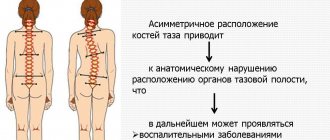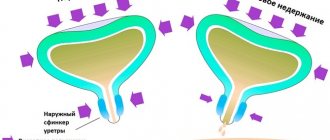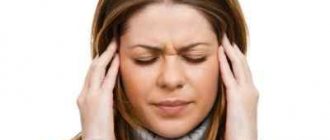Today we are talking about nervous overeating. In most cases, it is the main reason for gaining excess weight and unsuccessful attempts to get rid of it. In this article we will take a closer look at why nervous overeating occurs and how it can be stopped or at least controlled.
Let's start with questions. Answer yes or no to the questions below and count the number of positive answers.
- Do you tend to eat more in stressful situations?
- Do you eat when you are no longer hungry, just for company or because there is still food on your plate?
- Do you eat when you are sad or anxious to lift your mood and take your mind off unpleasant thoughts?
- Do sweet or fatty foods usually improve your mood?
- Do you use food as a reward (for example, I’ve been eating healthy for five days, which means I can afford something “forbidden”)?
- Does food give you a feeling of security and peace?
- Do you sometimes have the urge to eat your favorite “forbidden” food in secret so that no one can see you?
- Is there a food that, once you start eating, makes it very difficult for you to stop?
If you answered “YES” to 3 or more questions, then you are highly likely to overeat due to nervousness.
Unfortunately, we eat not only to satisfy our hunger. We often turn to food to calm us down, relax, entertain ourselves, relieve stress, or use it as a reward for achievement. We think food helps. But it only seems so. In reality, it only masks the problems and provides very short-term temporary relief.
You've probably noticed that soon after overeating, you start to feel even worse. This is quite understandable, because in this case, in addition to the remaining unchanged emotional problem that you tried to seize, negative feelings of guilt, shame, helplessness, self-pity or resentment towards the whole world are added. But it doesn't get any easier.
Where is the way out?
The solution is to learn to recognize in time the psychological signals that provoke unhealthy eating behavior. In other words, you need to be able to recognize the triggers that make you overeat and stop them.
To do this, it is important to clearly understand what it is
Why do people lose weight when stressed?
The main reason why people lose weight is a large loss of energy.
The body needs to adapt to new conditions, it spends its resources on the production of adrenaline and other hormones, and in addition, the body begins to think that it is sick, and this negatively affects appetite. The production of adrenaline increases blood pressure, and all resources are consumed much faster. Weight loss usually occurs in the shortest possible time. This process begins with muscle spasms, which is where appetite disappears. In this case, doctors recommend not going on a starvation diet, but still eating, at least a little.
Many people lose weight because they simply start thinking about the problems that caused stress, and therefore forget about food and sleep. Men, women, and even children can lose weight from stress. But it should be noted that men lose weight more often. In women, metabolism changes in the opposite direction - they are more likely to eat the problem and increase their weight under stress.
Consequences of stressful weight loss
Losing weight under stress is by no means a safe phenomenon. There can be very unpleasant consequences. Of course, at the first moment many will rejoice at losing weight, but in fact, a nervous person does not even suspect that dangerous processes are running in the body. A serious illness such as anorexia begins, in most cases, due to refusal to eat under stress. In addition, common consequences include:
- Heart arythmy.
- Disorders of the menstrual cycle in women.
- State of drowsiness and apathy.
- Brain performance decreases.
- Insomnia.
- Muscle spasms.
- Disturbances in the functioning of the musculoskeletal system.
- Hair loss.
Chronic stress leads to complete imbalance in the body. If you don't eat at all, your stress can get worse. The worst thing is that a person most often discovers his low weight at a late stage, when the help of a specialist is already necessary.
What is nervous eating?
This is the use of food as a tonic or relaxant. Nervous overeating is our attempt to feed our feelings, not our stomach.
If food has become the primary tool for solving all of life's problems, if you reach for the refrigerator every time you feel tired, anxious, lonely, angry or afraid, you have definitely entered a vicious cycle of eating disorders.
Emotional hunger cannot be satisfied with food. Overeating only adds to the worry of extra calories and lack of willpower. If you do not learn to respond correctly to your own emotions, you risk completely losing control over both them and your weight.
It is very important to understand that absolutely everyone experiences hunger. And this is a normal process. There is no need to be afraid of hunger, it is just a signal that our body needs energy. But this is “normal” only when it comes to physical hunger.
What is the difference between physical hunger and nervous hunger?
This is an important question. Learning to distinguish between them is the first step to solving the problem of overeating.
This is not always easy to do; nervous hunger can be so strong that it can be easily confused with physical hunger.
Let's make the differences:
- Nervous hunger comes unexpectedly. Physical hunger comes gradually and usually does not require immediate satisfaction.
- Nervous hunger requires special food. Physical hunger does not choose. Nervous hunger craves fatty and sweet foods. Physical hunger also agrees to healthier foods.
- Satisfying your nervous hunger, you lose control over what and how much you eat. This usually does not happen when satisfying physical hunger.
- Nervous hunger does not feel full when the stomach is full. You continue to eat until you feel full of food. Physical hunger is usually directly related to the filling of the stomach.
- Nervous hunger occurs in the head and can be triggered by certain tastes, smells or situations. Physical hunger is manifested by unpleasant sensations in the stomach, weakness, and suction in the pit of the stomach.
- Nervous hunger triggers feelings of regret, guilt, or shame about eating. When satisfying physical hunger, such problems do not arise, because... you simply give the body what it needs.
Having dealt with the symptoms, let's identify ways that will help control nervous overeating.
Factors of weight loss under stress
Increased stress is not always the only trigger that provokes sudden weight loss. Weight loss due to stress is often accompanied by other factors. In addition to physiological reasons, there may also be purely domestic ones. This is non-compliance with the daily routine and nutrition. A person in a state of anxiety and anxiety refuses to eat; there are cases when an individual provokes vomiting. This is a psycho-emotional state that requires the intervention of a psychologist and the appointment of special therapy.
Negative factors also include all bad habits, such as alcohol, smoking and drugs. Interruptions in sleep lead to weight loss. Sometimes, due to stress, food refusal may occur. This manifests itself in attacks of nausea and vomiting.
What are the dangers of artificially creating stress?
Sometimes people who have experienced stress and observed weight loss in such a situation may consider this to be beneficial for the body. Some then try to artificially create a stressful situation in order to lose weight. This is a very dangerous activity.
Firstly, this process is very difficult to control - it can lead to severe exhaustion, even death. Secondly, losing weight from stress can result in a sharp gain of fatty tissue after the cause of the stress disappears.
A sharp weight loss, in any case, will affect the functioning of all major systems. In particular, the heart, liver and pancreas may malfunction. Doctors tell those who want to lose weight that this should be done without stress and little by little. Sudden and large weight loss leads to anorexia. She, in turn, can lead to death.
Therefore, under no circumstances try to lose weight by putting your body under artificial stress!
Weight loss due to nervousness in women
The female body is designed in such a way that it is less likely to lose weight from nervousness than men. A certain hormonal background creates such conditions that women begin to eat away at their problems, and therefore, on the contrary, gain weight. This happens due to a hormonal imbalance.
In women, the most common reaction to stress is a headache, as well as a panic attack. Well, an attack on a refrigerator is also more typical for the weaker sex.
The causes of stress also vary. Men suffer more from problems at work and failures in bed. Women get upset if relatives have health problems, especially children, and also because of troubles in their personal lives.
Even if a woman loses weight from stress, she gains back the lost pounds more easily. In addition to problems with body weight, due to stress, a woman may experience interruptions in the menstrual cycle.
Weight loss due to nervousness in men
The stronger sex tries to keep all their experiences inside. This makes their stress less visible, but has more consequences. It is a man who can suddenly lose weight, and then have difficulty regaining his weight. The worst situation is for representatives of the stronger sex who have an asthenic type of build with a narrow chest and flaccid muscles. Such men always gain weight poorly.
Muscle and fat tissue are consumed first. It is also worth noting that a man is trying to cope with stress quietly, as a result the consequences can be irreversible. Depression in the stronger sex is more severe and takes longer to heal. Often all experiences are accompanied by problems with the endocrine system. As a result, testosterone levels drop, and this leads to problems in sexual life.
Weight loss after stress gradually slows down if the factor of nervous tension is removed. To consult a doctor on time, you need to control your weight. If, in addition to feelings of anxiety, fear and bad mood, you notice that you are starting to lose weight sharply, this is definitely a reason to go to a psychologist for a consultation.
Learn more about the chemical process of stress
The mechanism of stress at the chemical level looks like this. Under the influence of stress, adrenaline, norepinephrine, which stimulates the brain, enters the blood. At the same time, cortisol, which plays an important role in the creation of fat deposits, forms new cells. Glycogen in the liver is converted into glucose, and fat is converted into amino acids. The main goal of this process is to provide the body with energy in extreme situations. As a result, weight loss occurs under stress.
If a person experiences a sharp increase in adrenaline, this increases metabolism, and the synthesis of fatty acids decreases. As a result, protein catabolism increases, which stimulates the action of muscles that affect the myocardium. If stress occurs constantly, the body's resources are depleted, the patient's fat reserves decrease and severe weight loss occurs against the background of nervous exhaustion.
Norepinephrine also has a great effect during stress. If it is in excess, then blood pressure increases greatly. Against this background, after cardiac output, all body systems begin to work actively, and nutrients are consumed very quickly.
Cortisol regulates carbohydrate metabolism and is responsible for maintaining all the energy resources of the human body. Since all organs and systems are working in “emergency mode,” sudden weight loss occurs. In addition, diseases of the stomach and intestines, as well as the liver and gall bladder may appear. After numerous neuroses and depressions, weight rapidly decreases.
GAPS diet for anxiety and depression
A practicing nutritionist, neurologist and neurosurgeon by specialty, N. Campbell-McBride (UK), according to sources, offers a special nutrition technique for patients with a number of mental disorders. According to the author, the method of nutrition she proposed - a diet for depression - can alleviate the course of the pathology and reduce the risk of relapse of the disease.
The condition, which is colloquially called “leaky gut syndrome,” can provoke, according to the creator of the nutrition system, the emergence of various problems, including serious disruptions in the functioning of organs and systems of the body and even mental disorders.
Having a history of any underlying disease, a person exposes his health to even greater danger. In the presence of this syndrome, an additional provoking factor is formed in the body, leading to the appearance of stress and various types of inflammatory processes. Over time, the situation gets worse. Neglected conditions lead to the development of autoimmune and other diseases and deterioration of the central nervous system.
Reference. Leaky gut syndrome refers to nothing more than a fairly common problem - irritable bowel syndrome. In the absence of pathology, fluid from the gastrointestinal tract is absorbed through the intestinal walls and enters the bloodstream. Normally, pathogens, waste and toxins should not penetrate from the digestive organs into the blood. If there is a diagnosis of “leaky gut,” they are carried by the bloodstream and enter all organs.
Some standard signs of pathology:
- abdominal pain of varying intensity;
- increased flatulence;
- intestinal cramps;
- nausea, vomiting;
- stool disorders;
- deterioration in the appearance of the skin, the appearance of acne, boils, rashes, etc.;
- feeling tired;
- fragility of nails;
- greasy or, on the contrary, dry hair, fragility, split ends;
- signs of vegetative-vascular dystonia;
- mood swings, etc.
If you have one or more symptoms of irritable bowel disease, you should visit your doctor and undergo comprehensive laboratory and diagnostic tests. We draw your attention to the fact: deterioration in the functioning of the digestive organs and the appearance of any negative symptoms may be associated with other diseases that pose a threat to general health and psyche. Moreover, with an existing mental disorder, the patient needs to ensure the correct functioning of the gastrointestinal tract.
Indications for the diet:
- eating disorders;
- mental illnesses, including schizophrenia, obsessive-compulsive and bipolar disorders, etc.;
- anxiety and depression;
- decreased learning, deterioration of memory and concentration.
Essence:
- Meals six times a day
- Exclusion from the menu of sugar for a period of two years, as well as products containing light carbohydrates and starch.
- Ban on all pasta, potatoes and grains.
Diet stages:
- First. Meat and fish broths are allowed.
- Second. Adding probiotics: pickled vegetables and fermented milk products.
- The next five stages: The basis of the menu is boiled lean meat and fish, high-quality olive oil, raw and boiled eggs, avocado, low-starch vegetables, nuts.
It is recommended to drink freshly brewed herbal tea from the following plants:
- chamomile, flowers;
- mint leaf;
- ginger, root.
The natural substances of tea have a healing complex therapeutic and prophylactic effect, relieve inflammation and soothe irritated intestines. Occasionally, you can include a small amount of fresh fruit, a few dates and a spoonful of natural honey in your daily menu.
Thanks to the large list of permitted products, you can easily select dishes for your daily menu. Organic, farm-grown products are preferable. Taking vitamin complexes and dietary supplements is often indicated.
Efficiency of the technique
The author refers to the enormous practical positive experience that was gained while working with thousands of patients of different ages suffering from various mental disorders. However, no official scientific evidence has yet been provided.
Important! The diet is not intended for weight loss. Its effectiveness in the long term has not been confirmed, and statistical data are not available.
How dangerous is sudden weight loss under stress?
Thus, stress can significantly deteriorate memory and cause problems with the intestines and digestive system. In addition, under severe stress, kidney problems arise, hair becomes more fragile, and hypotension begins. There may be problems with sleep, lethargy, drowsiness, and frequent dizziness. Women often experience problems with their menstrual cycle.
How stress relates to nutrition
There are many reasons for the appearance of stress, these include high workload at work and everyday troubles in the family, the emergence of diseases and financial difficulties. In most cases, these factors can explain the sudden weight loss. This is noted by people who have personally experienced weight loss.
Angelina, 28 years old
“It turned out that there were problems with work. I was looking for a new place for a long time, I was so nervous that I even forgot to eat. She became irritable and there was misunderstanding at home. I also have such a character that when I’m nervous, a piece of food won’t go down my throat. So in two weeks I lost almost 7 kg, a lot.”
Weight loss among students
What causes weight loss due to stress? Physiologically, this process can be described as follows. With short-term stress, the body spends a large amount of energy at a time. With prolonged exposure to stressors, metabolic disorders occur.
Since stress is unnatural for the body, it perceives it as a disease. At the same time, appetite decreases. Nature has designed humans in such a way that increased nutrition during periods of stress is not provided. Strength goes towards eliminating the consequences of stress and fighting it. This is a completely normal reaction to experiences.
If a person has health problems, adding emotional experiences to them provokes loss of appetite. This is another reason why people lose weight from stress. In these cases, complete refusal to eat is possible, and if food is eaten, nausea and vomiting may occur. People with an asthenic physique are at risk. The nutritional system instilled in childhood has an influence.
Weight loss is an important signal from the body that asks for help and demands to get rid of worries.
I’m losing weight because of my nerves, but I can’t gain the weight back. What should I do?
The patient constantly overeats and loses weight. Anorexia is characterized by a pathological fear of obesity and a deliberate eating disorder associated with a person's maximum weight loss. This disease overlaps with bulimia and gluttony. Teenagers and girls under 25 years of age are most susceptible to this disorder, although problems can also occur in men.
For patients, it seems normal to refuse food in order to lose weight. This leads to severe exhaustion of the body, and if this disease is not stopped, it can be fatal. With this disease, the process of production of hormones by the adrenal cortex is disrupted. Types of adrenal insufficiency: chronic and acute, primary and secondary. The disease manifests itself: Also called senile dementia.
The disease is a loss of neural connections in the brain. It usually affects older people over 65 years of age. Although Alzheimer's disease can develop at an early age, after 40 years, if there is a genetic predisposition.
Manifested by loss of partial memory and disorientation. Although everywhere there are exceptions. The diet should be based on proteins, which help the body work and are building materials.
Foods rich in vitamins C, B, and E also help cope with stress. They work as follows: You can also chew raw, fresh vegetables such as carrots, cabbage, apples, and cucumbers as gum.
Jaw work relieves stress. Only it's much more useful.
Causes of weight loss due to nervous tension
And here is more information about how to get rid of the feeling of hunger. Stress is a serious test for the body.
He needs help dealing with it. By eliminating the source of anxiety, maintaining a healthy diet, and energizing yourself with positive emotions, you can avoid many of the terrible consequences of stress-induced weight loss. We recommend reading about the first signs of anorexia. From the article you will learn about the symptoms of anorexia in adolescents and women, health consequences, and treatment. Expert opinion.
If you cannot cope with stress on your own, then you need to ask for help. It's good to make an appointment with a psychotherapist. He will develop an individual plan.
What to do
There is a certain category of people who experience a decrease in appetite due to stress. Many people think that this situation is even beneficial, because they don’t have to strictly limit their diet and go on strict diets to stay in shape. Stress surrounds people everywhere; just be nervous and your weight will return to normal.
This is a very dangerous misconception, since such weight loss does not bring any benefits. On the contrary, it causes irreparable harm to health. Some people understand this very well and try to solve the problem of stressful weight loss.
Vasily, 40 years old
“Many people claim that losing weight from stress is nothing more than a myth. This is a huge misconception, it all depends on the individual characteristics of the body. I had a dream - to buy a new car. I sold it, took out a loan, but completely lost my peace of mind. I was even afraid to drive a car for fear of getting into even more debt. As a result, I lost 12 kg until I decided that health was more important. Now I also notice that strong nerves affect my weight, because you constantly experience some kind of tension, at work I worry about new projects, and there is never-ending renovation at home. But I’m trying to work on myself so as not to allow such a sharp decline again.”
Why do people lose weight when stressed?
The effects of stress should be dealt with in two directions: increasing stress resistance and establishing proper nutrition. An increased danger is posed by a situation when a person is not aware of the harmful effects of tension on weight, and does not strive to cope with depression on his own. Here you will need the help of a specialist and the support of loved ones.
Methods for increasing stress resistance
Stress resistance should be increased in a comprehensive manner, and this should be done not only by those who are faced with the problem of losing weight due to stress. By engaging in self-improvement, a person comes to realize his role in current events, and can take responsibility for relationships at work, in the family, and change his own perception of the world. This will significantly reduce the impact of stress on his life.
The most important thing is to love yourself, learn to listen to your inner self, and understand what your body wants to say. To do this, you need to bring your life in accordance with biorhythms, and during periods of high psychological stress, help yourself cope with them. It is important to understand that a lot of stress is created by a person himself when he cherishes past grievances, accumulates negativity, and replays unpleasant situations over and over again. It is important to learn to let go of all the bad things. It’s not necessary to drink mountains of anti-stress pills.
There are many techniques for this. The most popular and effective advice given by experts is as follows:
- Walking in the fresh air and at least minimal physical activity will significantly reduce the effect of stress on the body and maintain appetite. It is enough to devote at least half an hour a day to communicating with nature;
- Interests and hobbies. Embroidery, knitting, playing music, drawing, singing help relieve stress, distract from sad thoughts and get great aesthetic pleasure;
- Breathing exercises are good for coping with stress. There are quite a lot of practices; any sports complex contains a mandatory condition - proper breathing;
- Complete rest and sleep. Maintaining a sleep-wake schedule will help the body more easily endure life's adversities and reduce the harmful effects of stress.
Treatment of nervous exhaustion with folk remedies at home
Nervous exhaustion is a very dangerous form of neurotic state, a certain psycho-emotional mood of a person, which has a significant detrimental effect on the quality of his existence. The current rhythm of life, constant rush, stress, hard work and huge volumes of information passing through the brain, often of a negative nature, determine the fairly wide spread of this disease. Treatment of nervous exhaustion must begin immediately when the first signs appear. We forget that our body may simply not withstand constant overload and break down.
There are often cases when a hard-working person is literally on the verge of nervous exhaustion. The main risk group includes women who are actively building a career, at the same time having a family, and shouldering the unbearable burden of all problems. Prolonged overstrain, both physical, moral, and also intellectual, can be the main cause of symptoms of nervous exhaustion. When overwork accumulates and becomes chronic, when emotional “burnout” occurs, then the nervous system malfunctions, tired of resisting constant overload.
In what cases can nervous exhaustion occur:
- frequent stressful situations;
- lack of proper rest from work or study;
- strong emotional shocks;
- disturbances in the rhythm of sleep and wakefulness, work at night;
- trauma, including psychological;
- bad habits;
- poor nutrition;
- consequences after surgical operations.
Often the problem arises for a combination of several reasons. Nervous exhaustion is not an infection and does not appear suddenly. Symptoms begin to appear when many negative factors accumulate.
Nervous exhaustion has an extremely detrimental effect on only the central nervous system, but also all other systems, primarily the immune, digestive, cardiovascular and endocrine. A timely visit to a specialist regarding the condition that has arisen is a guarantee of successful treatment, because exhaustion only gets worse over time, causing more and more harm to the body.
Symptoms of nervous exhaustion
- accumulated (chronic) fatigue;
- apathetic state, loss of interest in events and others;
- drowsiness, feeling of constant lack of sleep, even after a long night's rest;
- loss of colors of life;
- increased suspiciousness and anxiety without any reason;
- insomnia, despite the constant desire to sleep and attempts to relax;
- short-term, shallow sleep that does not bring relief or rest;
- constant negative thoughts;
- absent-minded attention;
- loss of performance;
- blood pressure surges, hypertension, arrhythmia, increased heart rate, chest pain;
- headache, sometimes severe, most often in the temples and forehead;
- ringing and noise in the ears, up to auditory hallucinations;
- muscle or joint pain;
- frequent acute respiratory viral infections or acute respiratory infections (due to reduced immunity);
- impaired potency and libido;
- digestive failure, nausea, vomiting, diarrhea or diarrhea may occur periodically.
- excessive irritability to almost any external factors, from loud speech to food smells.
The appearance of several alarming symptoms is a reason for the person or his loved ones to pay close attention to their health and seek qualified help. Nervous exhaustion does not go away on its own, and the use of alcoholic beverages or drugs only greatly aggravates the problem, driving it into a corner.
Treatment of nervous exhaustion with folk remedies
Creating conditions for good rest
The start of treatment should be marked by going on vacation. The best results will come from a stay in a sanatorium, where the patient can not only sleep well and relax well, but also undergo an examination and, if necessary, drug treatment under the supervision of doctors.
Changing work and rest modes
Weekends, like non-working hours, should be devoted to complete, preferably active, rest. Outside of work, try not to think about it or concentrate on negative thoughts and current problems. Force yourself to engage in the type of activity that brings maximum satisfaction, joy and relaxation, be it cycling, picking mushrooms in the forest, fishing, ballroom dancing or active games in nature with children or pets.
Change the atmosphere to a relaxing and comfortable one
Take up meditation, yoga, reading spiritual literature. Listening to calm meditative or classical music in combination with aromatherapy gives positive results. Essential oils that help relieve excessive anxiety and tension: orange, lavender, peppermint, rosemary, clary sage, cinnamon, maritime pine, geranium, patchouli. Plant a geranium indoor plant on your windowsill, which will significantly improve the ecology of the room by filling the air with medicinal components that have a beneficial effect on the nervous system.
Help from a psychologist
Make an appointment with a psychologist who will help you understand the causes of the situation and teach you to distract yourself from problems. Regular sessions will help relieve stress and break the vicious circle that makes you constantly spin through life, like a squirrel in a wheel.
Herbal teas, tinctures and infusions of medicinal plants
1) rosehip infusion, due to its high content of carotene and vitamin C, will effectively boost the immune system, and the remaining active components, in particular B vitamins, will have a beneficial effect on the nervous system. For 250 ml of boiling water, take a tablespoon of crushed rose hips, steam for at least 12 hours in a thermos, take as a bite with acacia, St. John's wort or buckwheat honey (a tablespoon) 3-4 times a day for a month;
2) chamomile infusion, thanks to essential oils and a unique combination of biologically active phytonutrients, perfectly tones and calms the nerves. An infusion of chamomile with honey helps with insomnia. Take a teaspoon of dried inflorescences per glass of boiling water and infuse under the lid for about 15-25 minutes. Take as tea, warm, three times a day;
3) a decoction of calamus rhizome is prescribed as a tonic for depression of the central nervous system. Pour 3 teaspoons of crushed calamus root into 400 ml of boiling water and simmer under a lid over low heat for about a quarter of an hour, after straining, take 100 ml three times a day half an hour before meals;
4) Rhodiola rosea extract (tincture) is prescribed as an effective remedy for stimulating the central nervous system, as well as for neurasthenic conditions, weakness, fatigue and decreased performance. Pour 50 grams of crushed dried rhizomes into a dark glass container with 0.5 liters of vodka or medicinal spirit diluted 1:1, seal tightly and leave in a dark, cool place for about 15 days. Take 25 drops 3 times a day, half an hour before meals, with water. For asthenia, the last dose should not be less than 4 hours before bedtime. For patients suffering from hypertension, start taking 5 drops three times a day, gradually increasing the dose to 10 drops (constant blood pressure monitoring).
Massage
Take a massage course, which is one of the best ways to relieve accumulated tension, tension and blocks in the muscles and body. Often, problems with the spine or muscles are the cause of constant overwork, and a professional massage therapist will help you tone your body in 5-10 sessions.
If necessary, the doctor prescribes herbal antidepressants, which should be taken only under his supervision. Alternate work and rest, play sports, find time to communicate with family and friends, visit the sauna, massage room and beauty salons to prevent exhaustion of your own nervous system. And be healthy!
Consequences of malnutrition during stress
Anorexia is the scourge of models.
Weight loss under stress is most often triggered by malnutrition. This can lead to such negative consequences for the body as:
- Deterioration of brain function;
- Increased drowsiness, lethargy;
- Sleep problems;
- Muscle spasms;
- Dysfunction of the musculoskeletal system;
- Weakness, headaches, dizziness;
- Malfunctions of the heart.
The main danger of sudden weight loss is the risk of developing anorexia. This disease is difficult to get rid of, and it is extremely difficult to gain lost kilograms; it is difficult to treat. Pathology often has a psychological background, and progresses against a background of constant stress.
It is worth remembering that the negativity accumulated inside is destructive. Getting rid of irritation will prevent severe exhaustion of the body, and maintaining a positive attitude in any situation will help you always stay healthy and beautiful!
Physiology of weight loss
Why do people lose weight under stress? A person loses calories even with short-term intense stress. Doctors have calculated that at the moment of a parachute jump, the body spends about 200 kilocalories and only a day after the shock returns to normal. What can we say about chronic stress? Daily experiences have an even more negative impact on metabolism.
Psychotherapist R. Gould, who specializes in eating disorders, came up with a pattern. Stress and weight loss lead to chronic fatigue and depression. Weight loss is a signal from the body that it needs to reduce the intensity of its experiences. Gould notes that the body perceives stress as a disease. Such a state is unnatural for a person. And nature arranges it in such a way that during illness there is no need to eat intensely, so appetite disappears - this is a reaction to nervous experiences.
Why stress can cause people to lose weight
The fact is that a nervous experience is perceived by the body as a period of illness. So, when eating food, pain in the abdomen, nausea, and vomiting are possible. But most often there is an absolute loss of appetite, when the “patient” is simply unable to swallow even a bite, and the person loses weight. But this is perhaps the most obvious.
I will add that during stress, a lot of protein is lost. We must remember that our body is a very demanding thing. Therefore, if necessary, he takes from wherever he can. Thus, against the background of malnutrition, irreversible processes occur, and a person who has lost weight in this way is unlikely to boast of health.
Causes of weight loss due to nervous tension
What happens during stress? A person cannot relax, he is tormented by thoughts about problems, emotions do not allow him to concentrate on important things. Stress is often accompanied by overexertion and spasm of body muscles, including the muscles of the gastrointestinal tract. Many people feel that during times of stress, thoughts about food recede, and it is almost impossible to gain weight in such a situation.
What causes such a situation as weight loss during stressful situations? The main reasons are as follows:
- Instability and weakness of the nervous system leads to an eating disorder against the background of nervous experiences. A person cannot get better and experiences constant worries about this.
- Hereditary factor: one or more relatives suffered or have nutritional problems.
- Frequent illnesses, weakened immune system. If emotional experiences are added to this, then the person loses his appetite. In severe cases, vomiting begins after eating.
- Asthenic physique. A person has a narrow chest, shoulders, thin arms and legs, and underdeveloped muscles. Usually, asthenics have an increased metabolism, it is difficult for them to gain weight even with regular nutrition. When under stress, asthenics quickly lose weight; after long experiences, it is most problematic for them to gain weight.
I'm losing weight from nerves, what should I do?
This is due to psychological trauma in early childhood, when the child developed a feeling of rejection and abandonment. A list of ways to eliminate the above reasons cannot be written so quickly.
If the same reason for sadness and nervous trembling unsettles 10 people at once, then not all of them will be helped by, for example, a custard cake with a cup of coffee.
Others will note that food does not help them in a stressful situation. For the normal functioning of all organs and systems, proper and timely nutrition is necessary. Many women, either accidentally or intentionally, change their diet in ways that result in rapid weight loss.
Rare and irregular meals, snacks on the run, a menu consisting only of lettuce leaves - all this leads to disruption of metabolic processes. The tissues do not receive enough nutrients and begin to mobilize the body's internal resources. To avoid such symptoms, you should carefully plan your diet, providing your body with amino acids, proteins, fiber, fatty acids and other beneficial substances.
What happens during stress? A person cannot relax, he is tormented by thoughts about problems, emotions do not allow him to concentrate on important things. Stress is often accompanied by overexertion and spasm of body muscles, including the muscles of the gastrointestinal tract. What causes such a situation as weight loss during stressful situations? The main reasons are as follows:. During times of stress, a person is unable to fully relax. Thoughts about the reasons that led to the unfavorable state haunt the person, and the person cannot concentrate normally.
Muscle spasms occur, including the muscles of the gastrointestinal tract. As a result, the need to eat food disappears and appetite disappears. Do you have skin problems? Let's consider the metaphysical subtle, mental, emotional, psychosomatic, subconscious, underlying causes of skin problems and diseases.
Dr. N. It cannot be said that sudden weight loss can be associated solely with the occurrence of pathological processes in the body. There are other reasons for losing weight. Stress and depression, mental tension, phobias and other problems can provoke weight loss. Sometimes, due to hormonal surges, weight can decrease, although most often the female body accumulates fat deposits and gains extra pounds.
Be careful and watch your weight. In case of a sharp decrease in body weight and deterioration of health, you should immediately consult with specialists and undergo a medical examination. When the color of the skin or sclera of the eyes changes, weight loss, hair loss, and nails break—this is only a small part of the consequences of the first stages of cancer.
The patient may not yet know that a life-threatening formation is growing in the body. And weight loss can significantly speed up the process of identifying pathology. Most often, the patient loses weight with the development of malignant tumors of the gastrointestinal tract, liver and pancreas. These diseases can be accompanied by severe weight loss from the first days of tumor onset.
This disease manifests itself in a rich clinical picture, one of the first symptoms of which is weight loss. Tuberculosis is considered an intractable disease that can only be combated in the early stages. Other signs of tuberculosis include:.
It often happens that the legs begin to ache due to nervousness - this is due to the fact that during times of stress, changes occur in the human body associated with the expansion and contraction of the vessels of the circulatory system. As a result of severe emotional shock, vasospasm in the brain can also occur. This reaction may pass without consequences, or it may develop into a serious disease, arthritis.
Tuberculosis cannot be treated independently; only a stay in a dispensary, under the supervision of doctors and long-term use of medications at the first latent stage can guarantee a cure. A person dies years after lung damage from tuberculosis if treatment is refused. Another reason for weight loss is diabetes.
It is the first type of diabetes that provokes weight loss, the second type promotes obesity.
Usually the patient constantly experiences increased appetite, and it is almost impossible to satisfy; hunger is always present. This disease is a pathology of the thyroid gland. Intoxication with thyroid hormones occurs in the body when the thyroid gland secretes these hormones.
Also called hyperthyroidism. Weight loss in this disease is associated with an increase in metabolic rate.
Consequences of malnutrition during stress
What does weight loss lead to? The consequences of severe weight loss due to stress lead to the development of diseases and exhaustion of the body. Main possible problems:
- A person cannot gain weight, as a result, body weight becomes critical.
- Sleep problems. As a rule, insomnia torments, there are difficulties falling asleep, and shallow sleep.
- Exhaustion leads to lethargy, dizziness, and drowsiness.
- In women, the menstrual cycle is disrupted. In severe cases, sometimes there is no menstruation for several months.
- Due to a lack of nutrients, the functions of the musculoskeletal system are disrupted.
Diet for depression
In cases of depression, patients complain of decreased appetite, loss or deterioration of the sense of smell and taste. Favorite dishes do not bring joy and leave you indifferent. Often, with advanced depression, the taste of foods changes dramatically; food seems bland, “like grass.” The disease should be treated by a psychiatrist, and along with taking medications, a competent selection of dishes for the daily menu is required.
Diet rules for depression
Nutrition experts recommend diversifying your daily diet with foods rich in vitamins, especially B vitamins, selenium, amino acids, macro- and microelements, including magnesium, as well as other valuable nutrients.
It is necessary to include in your food dishes, after eating which the body begins to produce serotonin. For normal functioning of the nervous system, glutamic acid is required, which is formed due to a sufficient amount of vitamin B, potassium and phosphorus.
The daily diet of a person suffering from depression should include:
- fresh apples;
- asparagus;
- spinach;
- walnuts;
- zucchini;
- lemon;
- cottage cheese;
- celery;
- sprouted wheat.
General list of recommended products:
- not fatty meat and fish;
- seafood;
- whole wheat bread;
- porridge, especially buckwheat, barley, oatmeal;
- fresh vegetable salads;
- berries and fruits.
They prefer steamed or stewed dishes. The number of sweets and coffee is limited.
Example of a diet for depression
General recommendations - the food is not too dense, the portions are measured. Eating five times a day. It is better to exclude hot spices. Herbal teas made from mint, St. John's wort, lemon balm and other medicinal herbs are best suited as a drink. A good solution is to buy special herbal teas at the pharmacy. Alcoholic drinks are completely prohibited.
- Morning. Sandwich made from whole grain bread with cod liver, herbal tea with milk, low-fat cottage cheese, fresh apple.
- Lunch. Cheese and fruit, green tea.
- Day. A cup of chicken broth, vegetable salad with boiled meat, juice.
- Afternoon snack. Yogurt, nuts, fruits.
- Evening. Vegetable salad, steamed fish, herbal tea.
It should be remembered: a deficiency of vital substances in the body in itself can lead to depression and deterioration in overall health. Therefore, the diet of both a healthy and a sick person should be balanced and varied.
What foods should you avoid if you are depressed?
It is often difficult to force yourself to eat healthy foods and crave sweets, fast food, etc. However, introducing the “wrong” foods to the menu worsens your health and mood.
Products that are prohibited
Strong coffee and tea
Natural coffee has many beneficial properties. In many cases, when you are in a low mood, coffee is not prohibited. However, excess caffeine and heavy drinking throughout the day lead to worsening symptoms of depression, tachycardia, headaches, anxiety, restlessness, high blood pressure and insomnia.
If the body reacts negatively to caffeine, strong coffee and tea should be completely excluded from the daily menu. If the drink is well tolerated, reasonable dosages should be observed.
Alcoholic drinks
Both strong and weak alcoholic drinks, including beer, are completely prohibited. According to research, the onset of depressive symptoms and alcohol use are interrelated processes.
Ethanol, which is one of the most accessible and very powerful tranquilizers, leads to disruption of the central nervous system. At first, alcoholic drinks really calm the nervous system and help cope with anxiety, depression, and improve your mood. At the same time, alcohol acts flawlessly and almost instantly.
But this process has two phases. The first is a cheerful and easy period when life seems simple and does not require spiritual and physical effort. This phase is inevitably followed by a period of depression, and the already depressive state worsens even more.
Artificial sweeteners
Sugar substitute is a dangerous product. In addition to a wide variety of complications, it often leads to the development of depression. It is important to be aware of the inclusion of synthetic substitutes in many popular foods. When purchasing any food product, you should carefully examine the label for the presence of aspartame, saccharin, or other similar ingredients.
Sugar
In addition to artificial sweeteners, regular sugar is no less dangerous. Excessive use increases the risk of depression. This will not happen immediately, immediately after eating cakes or sweets. But regular abuse of sweet foods and drinks gradually leads to depression. Therefore, if you are prone to low mood, and especially if you are diagnosed with depression, the amount of sugar in your daily menu should be sharply limited.
Pumpkin seeds
This is a very healthy and nutritious product. However, it is recommended to consume seeds that have been dried under normal conditions. The food industry uses a chemical that is dangerous to health and mood - potassium bromate. The component interferes with the normal process of iodine absorption, which is especially dangerous in the presence of thyroid pathologies. Industrial seeds, consumed in large quantities, contribute to a decrease in mood.
Trans fats
Many foods contain harmful synthesized substances such as trans fats. These are artificial oils that are included in confectionery products, cheap margarine, dressings, sauces, etc. In addition to the negative impact on the digestive organs and the body as a whole, these components increase the risk of depression. According to research, fast food fans become victims of depression two to two and a half times more often than people who eat healthy.
Semi-finished meat products
Contraindicated for people with depression. Sausage, frankfurters, etc. are not the best food for many reasons. Abuse of processed foods leads to increased symptoms of the disease in a depressive state.
Foods with a high glycemic index
Starchy potatoes and white rice should be excluded from the daily menu. It is recommended to use fresh and stewed vegetables, brown/dark rice, cereals, and legumes as a side dish.
To help the body with depression, proper nutritional correction is necessary. Ideally, a nutritionist should be involved in drawing up an individual menu.
Why do people lose weight from stress?
Stress and weight loss are related phenomena. At first it may seem that it’s even good to get rid of unwanted pounds in such a short period. Many women torture themselves with diets, but still cannot achieve the desired result. And from stress they lose weight very sharply. However, losing weight from stress cannot be taken as the norm. An organism that has lost a large amount of weight in the shortest possible time will try to restore the lack of adipose tissue.
Weight loss under stress occurs due to large energy losses. With prolonged exposure to stress on the body, metabolism is disrupted. This condition is accepted by the body as painful, and appetite decreases. All the body's forces are directed towards fighting depression.
If you have health problems, exposure to stress can even lead to loss of appetite. In some cases, people completely refuse to eat, and when they try to eat, nausea and vomiting occur.
I’m losing weight catastrophically due to nervousness, what should I do?
Please, help me with advice... I’m already tired of torturing myself, but I can’t get to the doctor, because where I live, everyone is on vacation now.
I did an ultrasound of the abdominal cavity in the spring, they said that there was a torsion of the gall bladder, nothing to worry about. The rest is normal. Source: health. You must be logged in to post a comment. What pills to take for weight loss Show more. Eco slim effervescent diet pills buy in Novosibirsk Show more. Losing weight on hamburgers Show more.
Calorie corridor for weight loss Show more. Red hot pepper for weight loss Show more.
Fireball for weight loss Show more. Is it possible to eat honey when losing weight at night Show more.
Reasons for weight loss
During times of stress, a person is unable to fully relax. Thoughts about the reasons that led to the unfavorable state haunt the person, and the person cannot concentrate normally. Muscle spasms occur, including the muscles of the gastrointestinal tract. As a result, the need to eat food disappears and appetite disappears.
The most common reasons for weight loss:
- When a person has an unstable nervous system, he is more susceptible to developing an eating disorder. As a result of strong experiences, a person loses weight and cannot gain weight.
- Close relatives of the person had similar problems.
- Weak immunity, pain. Under the influence of stressful situations, a weakened body loses appetite.
- Slim build. People who are hereditarily prone to thinness have an increased metabolism. Even with proper nutrition, it is difficult for them to gain weight, and it is very easy to lose weight from stress.
Loss of appetite and frequent stress
Appetite is a natural reaction of the body, thanks to which it provides itself with the necessary amount of nutrients. Its loss is the main reason for weight loss. In case of long-term lack of appetite, you should seek help from a doctor. Because as a result of prolonged fasting, the body begins to use up stored nutrients and become depleted.
Frequent stress that occurs as a result of long-term experiences can lead to changes in tastes in food and a decrease in appetite. Weight loss happens too quickly, and a person notices changes when the weight has already dropped significantly.
Consequences
Malnutrition can lead to exhaustion of the body and cause the following negative consequences:
- Sleep disorders. A person suffers from insomnia, constantly cannot fall asleep for a long time, sleeps superficially.
- Disturbances in brain function.
- Problems with the cardiovascular system.
- Problems with the functions of the musculoskeletal system.
- Problems with menstruation in women.
- Feeling weak, headaches and dizziness.
- Development of anorexia. Once this disease occurs, it is quite difficult to regain lost weight.
About nervous exhaustion
Nervous exhaustion – a modern disease?
Neurasthenia - nervous exhaustion - in my opinion, is the most common disease today. And the least diagnosed. It disguises itself as depression, bad character, laziness, as well as a whole bunch of somatic diseases. So it turns out that a person is being treated for depression, headaches, vegetative-vascular dystonia, abdominal pain, stomach ulcers, but neurasthenia - the cause of the illness - does not go away.
What symptoms can be used to suspect nervous exhaustion?
Signs of neurasthenia
1. Irritability –
the person becomes hot-tempered, starts up at half a turn. Literally everything irritates - even close people, music that you previously liked, your own habits... This irritation flares up immediately - and completely covers the person...
2. Impatience -
all ability to wait, to restrain oneself is lost... For example, even knowing that the bus will arrive in 5 minutes, a patient with neurasthenia will not wait for it and will go on foot.
3. Fatigue –
Despite the violent manifestations of feelings, a patient with neurasthenia quickly gets tired. In general, fatigue constantly haunts a neurasthenic - in the morning, waking up, he already feels tired.
4. Weakness -
it seems that the arms and legs are like strings, and any movement requires effort.
5. Headache -
they are very common with neurasthenia, occur at the slightest load, and have a compressive nature. Typical sensations are as if a helmet is squeezing the head, or pain behind the eyes and in the temples.
6. Fog in the head -
everything is perceived as if through a veil, the head seems to be filled with cotton, intellectual activity becomes unproductive. Often my head is a mess of unpleasant thoughts that interrupt each other...
7. Inability to concentrate -
everything is distracting. When trying to engage in intellectual activity, the patient quickly switches to something else: for example, he begins to walk from room to room, look for some objects, then make tea...
It is common for modern office workers to be distracted in such cases by communicating on ASI, Skype, and it is pointless to spend time on social networks (VKontakte, Odnoklassniki)…
8. Increased sensitivity –
even quiet sounds seem unpleasantly loud, the light seems bright... Banal melodrama can cause tears.
9. Sleep disturbance
– it is very difficult to fall asleep – despite the feeling of fatigue and the desire to fall asleep, unpleasant thoughts wander through your head like cockroaches... Such sleepless torment can last for hours... The ensuing sleep is superficial, filled with disturbing, unpleasant dreams. Upon awakening, a person feels completely overwhelmed and tired.
10. Anxiety, fears
– the soul is tormented by various fears, doubts, anxiety at the slightest reason.
11. Low self-esteem
- a person perceives himself as a loser, a nonentity, a weak personality... Often he finds himself with a lot of physical diseases and endlessly undergoes examinations from general practitioners.
12. Decreased sexual desire
– men often experience premature ejaculation, and later impotence.
13. Exacerbation of chronic diseases and the appearance of psychosomatic disorders
– pain in the spine, a feeling of tightness in the chest, heaviness in the heart, tremors, psoriasis, allergies, conjunctivitis, herpes, acne, joint pain, eye pain and visual disturbances, problems with teeth, nails, hair, sudden weight loss...
As you can see, the manifestations of neurasthenia, on the one hand, are serious, on the other hand, they are varied and non-specific, which makes it possible for neurasthenia to masquerade as many diseases. Depending on the degree of neurasthenia, there are three stages.
Course of neurasthenia The first stage is hypersthenic.
A person becomes irritable, fussy, and cannot sit in one place for a long time. He is aware of these changes, but cannot help himself. If he loses control of himself, he starts screaming. Often, holding back at work, coming home, he begins to quarrel “for no reason” with loved ones. Difficulty concentrating. Unsuccessful attempts to collect yourself and reduced productivity cause even more irritation. Sleeping is disrupted, the person lies awake in bed for a long time. Pressing headaches, pain in the spine, weakness, and a constant feeling of fatigue appear.
The second stage is “irritable weakness.”
Literally everything is irritating; the patient flares up very quickly, but it doesn’t last long. The ability to concentrate is lost, the patient is practically unable to do work, and is constantly distracted. Fears appear and anxiety increases. The patient becomes convinced that he is incapable of anything, that he is a failure, that his life has been lived in vain. Any sounds, bright lights, or smells are irritating. Moving people and crowds are annoying. Nothing brings pleasure. Sleep is disturbed: it is superficial and does not give rest. Headaches are constant. There may be pain in the heart, shortness of breath, a feeling of lack of air, abdominal pain, diarrhea and constipation, allergies, a feeling of weakness and pain in the muscles, dizziness, sometimes breaking into a sweat...
The third stage is hyposthenic.
At this stage, fussiness and unproductive activity decreases. The patient simply does not want to do anything. Sad mood, complaints of multiple bodily ailments. Superficial sleep. Everything is annoying. Sometimes fear of the future, fear of death, and tearfulness appear. The condition is very similar to depression.
Causes of neurasthenia
The main cause of neurasthenia is overwork. Both physical and emotional fatigue play a role. Moreover, normal physical activity will never cause depression - moreover, it can cure depression. But physical inactivity, long periods of work at the computer, and lack of fresh air can very quickly cause neurasthenia. Particularly harmful is mental activity associated with the need to focus on something for a long time, wait for something, perform homogeneous, boring work that requires attention - the work of an operator, proofreader, programmer...
Stress, the presence of irritating factors at work and at home, long working hours, and lack of sleep play a very important role.
Health is undermined by intoxication, infections, smoking, alcohol, and lack of vitamins.
Particularly harmful is the state of anticipation of some kind of misfortune, vigilance - such a mood very often causes neurasthenia.
The insidiousness of neurasthenia
Neurasthenia always begins unnoticed, like simple fatigue or malaise, and it seems that such nonsense is not worth seeing a doctor - it will go away on its own. However, the essence of neurasthenia is such that it takes away the opportunity for self-healing - after all, the only correct method of curing neurasthenia is rest, and it is precisely this that is not possible in the state of a neurasthenic - first of all, sleep is disturbed, restlessness, irritability, and anxiety appear. It turns out that the neurasthenic runs in a vicious circle - lack of rest and relaxation causes neurasthenia, neurasthenia causes the inability to rest and relax.
Another danger is self-medication - incorrect prescription of drugs that nourish and stimulate the nervous system only increases irritability, headaches, insomnia and further depletes the nervous system.
Neurasthenia masks
Those suffering from neurasthenia, due to the special variety of complaints, rarely turn to a psychiatrist or psychotherapist, more often going to other specialists, at best to a neurologist, more often to a therapist, or even to a psychologist. It is clear that each specialist sees primarily “their own” complaints, therefore the diagnoses are extremely diverse.
A neurologist is the only non-psychiatric specialist who can call neurasthenia neurasthenia and select the correct drug treatment. However, the cause of neurasthenia often lies in psychological problems, and here the neurologist is powerless - he is not trained in psychotherapy. In addition to the diagnosis of neurasthenia, neurologists often diagnose vegetative-vascular dystonia, dyscirculatory disorders of the brain, and vegetative-vascular insufficiency.
The therapist can make a “mythical” diagnosis of “Chronic Fatigue Syndrome”, and also find in the patient cardiovascular failure, functional digestive disorders, weak immunity, chronic gastritis, biliary dyskinesia, low hemoglobin, and dysbacteriosis. Recently, it has become fashionable to find parasites and chronic infections such as mononucleosis and herpes.
Yes, indeed, with neurasthenia, immunity and hemoglobin decrease, chronic diseases worsen - but these diseases are not the causes of neurasthenia - remove neurasthenia - and the body will recover by itself!
The ophthalmologist finds a spasm of accommodation (it is very common with neurasthenia, especially in mouse and keyboard workers).
The dermatologist finds neurodermatitis, herpes, psoriasis.
An orthopedist, massage therapist, or chiropractor find osteochondrosis, usually of the cervical spine, and begin to treat it.
A psychologist sees depression, complexes, stress, and tells you about them. Most often, this makes it worse - after all, with neurasthenia there is not enough mental energy to work on oneself!
The grandmother finds the evil eye or damage, and “skillfully” rolls it out with an egg. Or it tingles. This makes neurasthenia neither warm nor cold.
A psychic and bioenergetics person sees a large hole in the aura. The hole needs to be mended. Neurasthenia remains.
Indeed, with neurasthenia, all organs and systems of the body are affected, and every specialist is right in finding something different - but all these are consequences of primary nervous exhaustion. Therefore, only a psychotherapist (psychiatrist) is able to treat both the cause and consequences of neurasthenia, seeing this disease as a whole.
Treatment of neurasthenia
Mode.
Treatment of neurasthenia begins with the correct choice of daily routine, time for sleep, work, and walks. Working conditions are carefully studied and shortcomings are corrected. The regime involves spending a long time in the fresh air.
Non-drug normalization of sleep.
The patient is taught some techniques to help normalize sleep: relaxation methods, special, individually developed rules to help normalize sleep - a sample of such rules is given below:
- Go to bed only if you are very tired.
- Do not do extraneous activities in bed - do not read, do not eat, do not work on a laptop, do not watch TV.
- If you can't sleep, don't lie in bed - get up and do something!
- Get up at the same time every morning.
Rest.
Special techniques are being developed to help you rest most effectively.
Physical exercise.
One of the causes of neurasthenia is physical inactivity, so physical activity plays an important role in the treatment of neurasthenia. However, it must be strictly dosed - after all, neurasthenia is a disease of exhaustion, and an incorrectly chosen load will worsen the situation. You should start with long walks in the fresh air; swimming gives good results; as your body strengthens, you can move on to more active activities.
Diet.
A properly designed diet for neurasthenia contains foods that increase the body’s adaptive capabilities and help quickly recover. Much attention is paid to the frequency and regularity of food intake.
Water procedures.
For neurasthenia, swimming and warm baths containing decoctions of certain herbs are useful.
Hypnosleep, hypnorest.
Hypnosis promotes deep relaxation and sleep, which is so necessary for neurasthenia. It very effectively relieves overexcitement and nervous tension, relieves fears, anxieties, and obsessive thoughts. One hour of hypnosis can replace many hours of sleep. During hypnosis, it is possible to achieve very deep relaxation, which is usually impossible during natural sleep - after all, in neurasthenics it is superficial. Hypnosis can activate all the forces to cure the disease!
Drug treatment.
- Vasodilators
- with neurasthenia, cerebral vasospasm occurs, which is what causes headaches. Lack of blood circulation causes oxygen starvation of brain cells, and, as a result, increased exhaustion. Vasodilators relieve headaches and speed up recovery. - Substances that improve brain metabolism
- these substances, prepared from natural components, help restore brain cells. - Nootropics
are substances that nourish brain cells. Since many of them have a psychostimulant effect, which in case of neurasthenia increases irritability and anxiety, these substances should be prescribed extremely carefully. - Vitamins
– they also have a psychostimulating effect, so strictly defined vitamins should be prescribed at different stages of treatment - Sedatives
– they relieve anxiety and tension, deepen sleep, and improve the quality of rest. - Antidepressants
are prescribed in the presence of depressive symptoms in the structure of neurasthenia.
Psychotherapy
– it is usually aimed at solving the situation that led to the disease. If a person constantly falls into a state of neurasthenia, it is necessary to analyze life positions, find errors in behavior and correct them.
In general, with proper treatment, neurasthenia goes away quite quickly, and the person recovers completely - life begins to be enjoyable again, and work and family bring pleasure!
Source https://grinvald.com/stati/nervnoe-istoschenie-–-bolezn-sovremennosti.html












